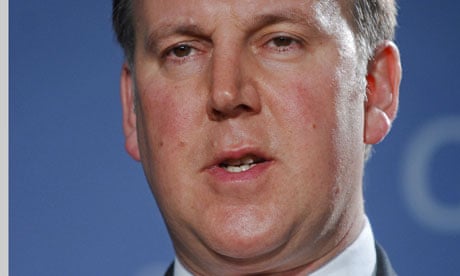Lord Fink, the Conservative party treasurer, is in the curious position of leading the charge against his own chancellor's budget. With support from more than 40 of the biggest donors, he warns George Osborne that the proposed 25% cap on tax relief for charitable donations by the mega-rich will "put people off" giving – and that the amount he gives will fall if his tax relief is capped.
The government announced a "consultation" yesterday, but it should stand its ground. Osborne is absolutely right to cut the colossal sums the rich can off-set against tax. Treasury figures released on Monday prove the tax campaigner Richard Murphy right: he has always said tax avoidance is far higher than the Treasury has been willing to admit, until now. Some of the richest, who pay no more than 10%, are, as Warren Buffett says, taxed less than their secretaries.
There has been little to praise this government for recently, but here's a brave tax reform that is easier for Conservatives to do. After the disgrace of cutting the top tax rate on the spurious grounds that the rich avoid paying it anyway, Osborne has a duty to block these tax reliefs for the wealthy. Off-shoring money in tax havens, offsetting contrived business debts, converting income to capital gains via private equity, and scores more wheezes, should be stopped: a 25% cap is a modest start. But by including charitable donations, he has allowed the mega-rich to climb on to their high horses. Against him is a powerful combination of the rich and a charity world more publicly respected than any mere government.
Lord Fink is a generous donor, but as the man known as "the godfather of the UK hedge fund industry", he has a lot of money to be generous with. Fortunes earned from engineering financial transactions were famously described by Adair Turner, of the Financial Services Authority, as "socially useless", so Fink's return of some of that cash cascade to good causes is only right.
I met Fink at a Lord Mayor's breakfast in the City, where he gave a remarkably frank address exhorting other "high net worth" individuals to give more. His approach was singular – but he knew how to tickle the pockets of fellow plutocrats. Forget any appeal to better natures, forget tear-jerkers about raising the aspirations of neglected children or supporting gallant lifeboat crews – he got straight to the point: self-interest.
"I want to talk about what charity can do for us," he said. He sold charity as a door-opener to high society. "What do you do now you've got all the toys?" he asked. "You've already got all the houses, yachts, cars and jets you can use, so what comes next is charity." Charity is not just for the joy of giving: "I get invited to places I'd never have seen otherwise." It is the passport to the in-crowd, he said, listing the eye-popping names and places his philanthropy had taken him, including No 10.
Some donors signing protest letters against the budget are entirely selfless – shy, retiring, generous and ready to support unpopular and radical causes with no conceivable payback. Gordon Roddick and David Sainsbury are among these rare birds. But charities frequently complain at having to spend an inordinate amount of time begging, cajoling, and flattering the rich and their foundations, instead of getting on with their good work. Many complain of donors abusing their power, trying to run a charity as their plaything with no more expertise from than saloon bar sociology gleaned from the Daily Mail. Tony Blair gave bored billionaires the chance to play with schools at £2m a pop, selecting the head, governors and curriculum at whim. What fun! The time spent filling in long forms applying to private foundations for money, each with a different requirement, each charity competing against the others for short-term grants, is phenomenally wasteful.
How much should the taxpayer contribute to the charitable whims of donors? Every time anyone gives to charity the taxpayer contributes, willy nilly, with no public accountability. Every pound in the tin for the Japan Animal Welfare Society or the Odinist Fellowship attracts 25% extra from the Treasury, but why? Charity is a precious expression of public goodwill and concern for others, a wellspring of innovation and a beacon for better ways to provide public services. Societies without a voluntary sector or the charitable impulse are grim indeed. But it's not clear why tax relief for the wealthy is a necessary ingredient.
Here's another eccentricity: if a basic-rate tax payer – ie 87% of the population – gives £1, the state adds another 25p in gift aid to the charity, but the donor gets no tax relief. Only 40% or 50% tax rate donors can claim a personal benefit and get their tax bills cut. Since those in the bottom 10% give a higher proportion of their income than those in the top 10%, that seems unfair.
From the outcry of the big donors, you might think they were being banned from giving. Not at all. They are only being told to pay their taxes like everyone else and then donate out of their taxed income, just like every basic-rate taxpayer. Paying your taxes is the most communitarian thing we do, signing up to society and the democratic choices it makes about taxing and spending. Voters decide. Giving to charity may be altruistic or self-interested, may or may not do good – but the present system draws in taxpayers' money with no such accountability. Osborne is right to ask why anyone should get tax relief.
This is probably the most bungled budget in history, fiscally neutral yet politically incendiary – mainly for that 50p top tax cut. Even if, in theory, it makes little sense for the state to contribute to the random giving whims of rich donors, this must surely be the worst time to cut charity incomes by £300m. Already Osborne's cuts have caused an 8% drop in charities' incomes while demand for their services soars. The Red Cross suggests what might be a compromise for now: abolish all personal tax relief for donors, but give the money instead direct to the charity, as gift aid does for basic-rate payers.
I had an email exchange with Stanley Fink after that breakfast, pointing out that big time charitable donors could do far more civic good by campaigning among their own kind against tax avoidance and in favour of a living wage. Their weight and power could move mountains. But instead he is Tory party treasurer raising money for the party that is cutting benefits for disabled children, while he opposes reform of tax relief for the super-rich.



